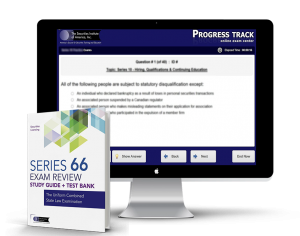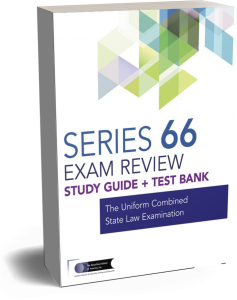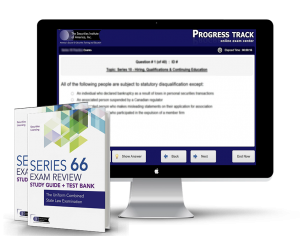Prepare to pass The NASAA Series 66 Uniform Combined Law Examination. Our Prep Course is the ultimate guide for achieving success on the series 66 exam. Our series 66 prep materials deliver the highest pass rates in the industry. In fact, we guarantee you pass. Check out our Series 66 Securities Training Course Highlights:

Incredibly comprehensive. Extremely detailed and test questions that match the actual series 66 exam. Is what students are saying about our study material.
$199.00

$ 199.00

$ 129.00

$ 124.99








Series 66 Combination Packages
All of our combination packages are discounted. Check out the prices! Purchase one of the following combination packages if you are really serious about passing your exam in the quickest possible time.



Series 66 Important Concepts
As money management developed over the last century, analysts began to shift their focus from the returns available from individual investments to the returns available from an entire portfolio. This approach became known as modern portfolio theory. Modern portfolio theory is based on the concept that investors are risk adverse. Through diversification of investments and asset classes, portfolios can be constructed with higher levels of expected return for each unit of risk assumed. Asset classes are divided into three main categories, stocks, bonds, and, cash and cash equivalents. Portfolio managers, through modern portfolio theory, can construct portfolios based on various allocations over the three main asset classes whose return will be the greatest given each unit of risk.
Read moreAn investment adviser charges a fee for his or her services for advising clients as to the value of securities or for making recommendations as to which securities should be purchased or sold. Unlike a broker dealer, the investment adviser has a contractual relationship with his or her clients and must always adhere to the highest standards of professional conduct.
In addition to the fees charged by an investment adviser, an investment adviser may also:
Read morePrior to conducting business in any state, a broker dealer must be properly registered or exempt from registration in that state. The first test when deciding if the broker dealer must register is determining if the firm has an office in the state. If the firm maintains an office within the state it must register with that state. An agent must register in their state of residence even if their firm is located in another state.
Example:
An agent who lives in New Jersey and who commutes to their office in New York must register in both New Jersey and New York.
The state securities administrator has the authority to enforce all of the provisions of the Uniform Securities Act (USA) within their state. The state securities administrator may deny, revoke, or suspend the registration of a security, an agent, or a firm. The administrator may also revoke an exemption from registration, subpoena and investigate any registrant, and amend rules as required. The North American Securities Administrators Association or NASAA is the oldest investor protection organization in the country and represents the interest of all of the state securities administrators. NASAA also writes policies and administers the series 63, 65, and 66 exams.
Read more
2025 © Securities Institute, All Rights Reserved.
Privacy Policy | Terms of Service.